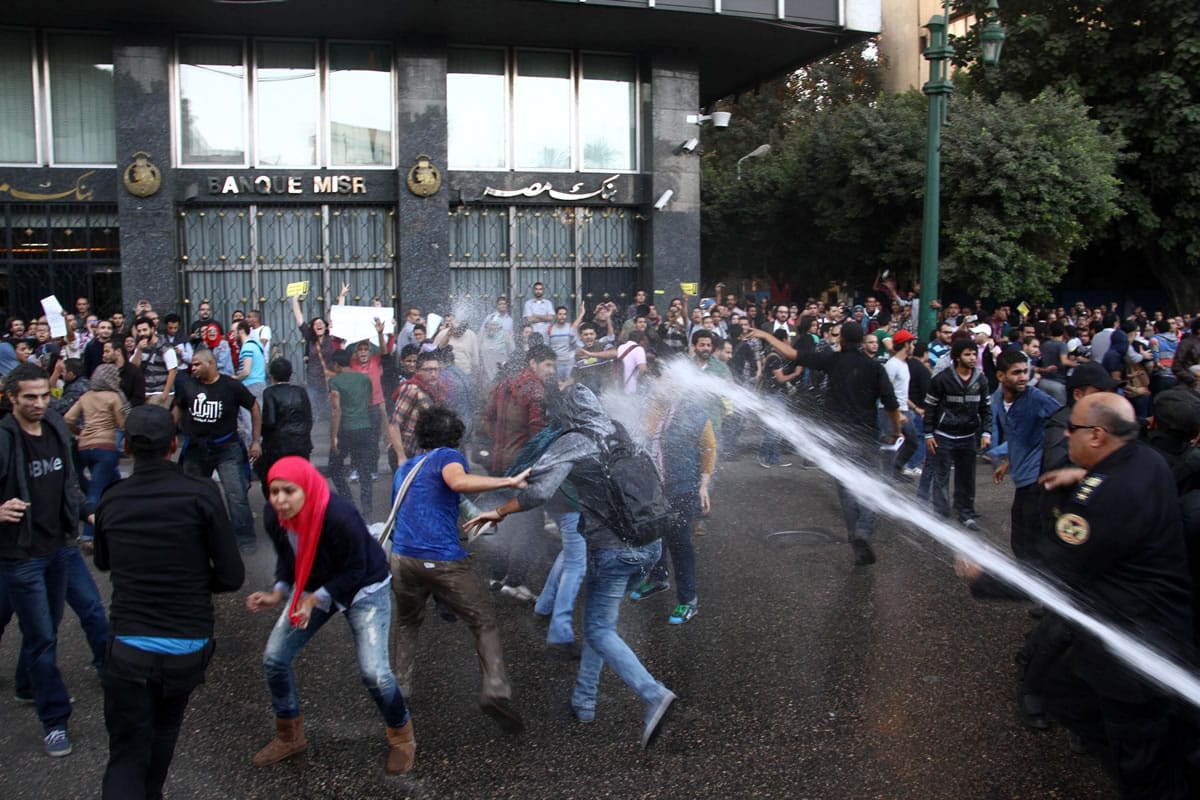CAIRO — Egypt’s police fired water cannons Tuesday to disperse two protests by dozens of secular anti-government activists in Cairo, the security forces’ first implementation of a controversial new law forbidding protests held without a permit from authorities.
The unrest points to the growing backlash against the law, which imposes heavy restrictions on protests, among the non-Islamist political factions that rallied behind the military’s ouster of Islamist President Mohammed Morsi.
Now some in the loose coalition are growing impatient with signs the military-backed interim government is taking the country down a more authoritarian path. Many non-Islamist activists say the law aims to silence any dissent ahead of a referendum on an amended constitution and other key elections. Those activists oppose provisions in the revised constitution entrenching greater powers for the military and the president, and curtailing rights to free trials and assembly.
The government says the law is needed to restore security and rein in near daily protests by Morsi supporters demanding his reinstatement. The Islamist rallies have often descended into bloody clashes with security forces, leaving hundreds dead since Morsi’s ouster in July. The government’s message has a strong resonance among a public weary of constant protests and unrest.
Rights groups and activists say the law, issued Monday by the interim president, will stifle Islamists and non-Islamists alike. They say it is harsher than restrictions on protests during the rule of autocrat Hosni Mubarak, who was ousted in 2011 in an uprising calling for greater democratic freedoms.
Announcing the breakup of the protests, a police spokesman said defiance of the law would not be tolerated.
“This behavior is a challenge to the state and its prestige. The protesters want to embarrass the state. But the state is capable,” Maj. Gen. Abdel-Fattah Othman told private CBC TV. “Any gathering without a permit will be dealt with according to the law.”
In Tuesday’s first protest, around 100 largely secular activists rallied downtown to commemorate an activist — Gaber Salah, known by the nickname “Gika” — killed by police a year ago. Police quickly deployed, and an officer told the gathering they had no permit, said activist Rasha Azab, who was among the protesters.
He gave two warnings before the police fired water cannons, sending the protesters running into side streets, she said.
“They don’t want anyone in the streets any more. Not us, not the Islamists,” said Azab.
Hours later, a similar group sprung up outside parliament, protesting moves by the panel amending the constitution to preserve a Morsi-era article that allows military trials of civilians. “Down with military rule,” they chanted.
Police trucks and armored vehicles deployed outside the parliament in a usually busy boulevard in central Cairo. Again, police gave a warning before firing water cannons, participants in the rally said. The melee outside forced the suspension of a session of the constitutional panel, held in the parliament building.
At least 35 prominent activists were detained by police and held in the parliament grounds, said Mohammed Abdel-Aziz, a lawyer who was among those detained.
Azab was also among those held in parliament. Earlier, she said she was briefly held by police in the first protest, but an officer let her go to tell her colleagues that no protests will be allowed without permits.
“I told him: You want me to take a permit after January 2011?” she said, referring to the start of the anti-Mubarak uprising.
“He said: This is what the moment calls for,” she said, adding, “They want to bring us back” to before 2011.
She said for the authorities, the secular activists — though smaller in numbers — “are more of a nuisance than the Brotherhood because we don’t have a central leader like the Islamists’ guide to tell us what to do.”
Security forces had heavily deployed across town where Morsi supporters had planned to hold a rally later Tuesday. Few pro-Morsi protests materialized in the capital.
Skeptical of both Morsi’s Muslim Brotherhood group and the military, activists who spearheaded the 2011 uprising against Mubarak have been organizing limited but rare non-Islamist protests in recent weeks demanding justice against police officials who killed hundreds of protesters during the tumultuous past three years. The activists have openly clashed with the military before — when generals directly ruled Egypt following Mubarak’s fall — and then with the Brotherhood during Morsi’s one year in office.
International criticism of the protest law has also grown.
U.S. State Department spokeswoman Jen Psaki said Tuesday that the law raises concerns. “We urge the interim government to respect individual rights and we urge that the new constitution protect such rights,” she said.
Amnesty International and Human Rights Watch also deplored the new law. They noted the vague grounds for denying permits for protests, including “threats to national security” or attempting to “influence the course of justice.”
The law will “will further entrench abuse” by police force, giving authorities free rein to use excessive force, including shotguns and rubber bullets against violators, Amnesty said.
“It is a dangerous sign that the first piece of legislation regulating rights and freedoms passed since the ousting of Mohamed Morsi curtails freedom of assembly and treats peaceful protesters like criminals,” said Hassiba Hadj Sahraoui, Amnesty’s Middle East and North Africa deputy director.
Human Rights Watch said the law will reverse the freedom to demonstrate which Egyptians seized with the 2011 uprising.
“Over the next nine months, Egypt will hold a referendum on the constitution, followed by parliamentary and presidential elections,” said HRW’s deputy Middle East director, Joe Stork. “The excessive notification requirements on election-related meetings will have a further chilling effect on freedom to campaign and on the pre-electoral environment.”



